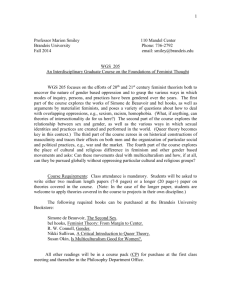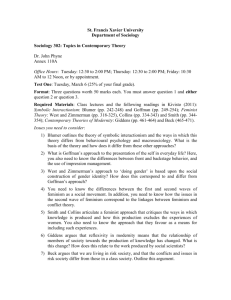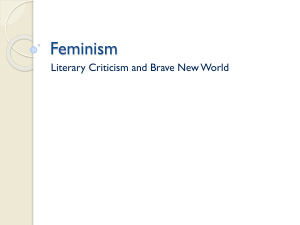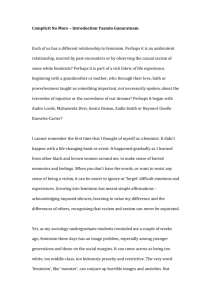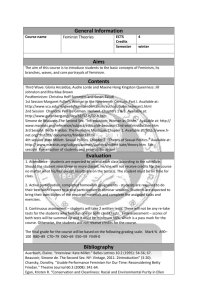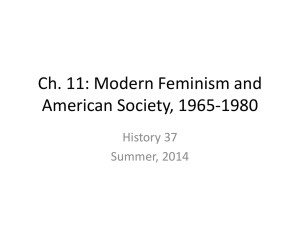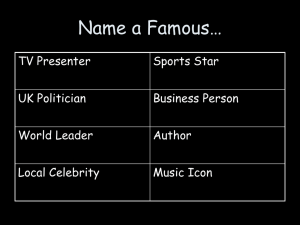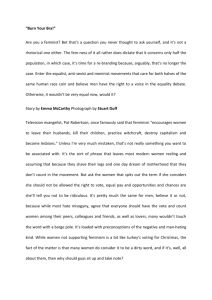final study guide - San Diego Mesa College
advertisement
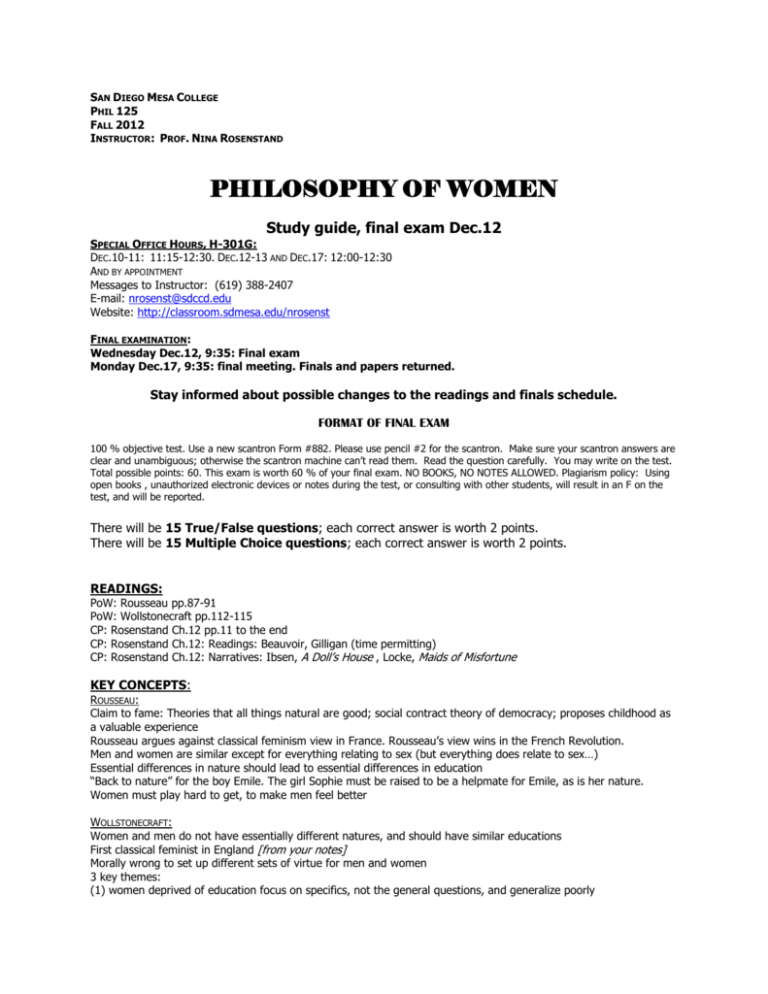
SAN DIEGO MESA COLLEGE PHIL 125 FALL 2012 INSTRUCTOR: PROF. NINA ROSENSTAND PHILOSOPHY OF WOMEN Study guide, final exam Dec.12 SPECIAL OFFICE HOURS, H-301G: DEC.10-11: 11:15-12:30. DEC.12-13 AND DEC.17: 12:00-12:30 AND BY APPOINTMENT Messages to Instructor: (619) 388-2407 E-mail: nrosenst@sdccd.edu Website: http://classroom.sdmesa.edu/nrosenst FINAL EXAMINATION: Wednesday Dec.12, 9:35: Final exam Monday Dec.17, 9:35: final meeting. Finals and papers returned. Stay informed about possible changes to the readings and finals schedule. FORMAT OF FINAL EXAM 100 % objective test. Use a new scantron Form #882. Please use pencil #2 for the scantron. Make sure your scantron answers are clear and unambiguous; otherwise the scantron machine can’t read them. Read the question carefully. You may write on the test. Total possible points: 60. This exam is worth 60 % of your final exam. NO BOOKS, NO NOTES ALLOWED. Plagiarism policy: Using open books , unauthorized electronic devices or notes during the test, or consulting with other students, will result in an F on the test, and will be reported. There will be 15 True/False questions; each correct answer is worth 2 points. There will be 15 Multiple Choice questions; each correct answer is worth 2 points. READINGS: PoW: Rousseau pp.87-91 PoW: Wollstonecraft pp.112-115 CP: Rosenstand Ch.12 pp.11 to the end CP: Rosenstand Ch.12: Readings: Beauvoir, Gilligan (time permitting) CP: Rosenstand Ch.12: Narratives: Ibsen, A Doll’s House , Locke, Maids of Misfortune KEY CONCEPTS: ROUSSEAU: Claim to fame: Theories that all things natural are good; social contract theory of democracy; proposes childhood as a valuable experience Rousseau argues against classical feminism view in France. Rousseau’s view wins in the French Revolution. Men and women are similar except for everything relating to sex (but everything does relate to sex…) Essential differences in nature should lead to essential differences in education “Back to nature” for the boy Emile. The girl Sophie must be raised to be a helpmate for Emile, as is her nature. Women must play hard to get, to make men feel better WOLLSTONECRAFT: Women and men do not have essentially different natures, and should have similar educations First classical feminist in England [from your notes] Morally wrong to set up different sets of virtue for men and women 3 key themes: (1) women deprived of education focus on specifics, not the general questions, and generalize poorly (2) women deprived of education are like military officers: concerned with appearance and gossip (3) The “after-the-wedding” problem: what happens when all a wife knows is to flirt and play hard to get? ROSENSTAND CH.12 PP 11 to the end France in 1700s: Condorcet argued for women’s rights, Rousseau argued against it. England in 1700s: Mary Wollstonecraft England in 1800s: John Stuart Mill and Harriet Taylor Mill Feminism in America: 1st wave until 1920, 2nd wave 1950s-1980s, 3rd wave present day Debate: can a conservative be a feminist? 4 facets of feminism: classical, difference, radical, equity feminism Simone de Beauvoir: classical feminist and existentialist existentialism: no God, total freedom, total choice with responsibility [from your notes] Bad faith: believing you have no choice (but you always do) Woman has become the Other to man, and herself. Must change. There is no human nature, including female nature gender differences are completely due to education/upbringing Goal: androgynism Problem: Does Beauvoir see the male norm as the ideal norm? Storm: an attempt to raise a gender-neutral child in the eyes of the world The rise and fall of the theory of psychosexual neutrality (the David Reimer case) Difference feminism accuses classical feminism of somatophobia [from your notes] Carol Gilligan: difference feminist, and psychologist Women are fundamentally different from men, and women’s nature and values should be upgraded as “normal” Women speak “in a different voice” morally: ethics of care (vs male ethics of justice) Kohlberg’s Heinz Dilemma: Jake’s and Amy’s answers to “Should Heinz steal the drug?” Problem: Does Gilligan recreate male and female stereotypes to the detriment of equality? Christina Hoff Sommers: Equity feminist: the job of feminism is done Radical (gender) feminists have hijacked feminism Now boys need more attention in school than girls. Radical feminism (Andrea Dworkin): examining the roots of sexism in patriarchy. The fight for equality has just begun; many women have a false consciousness and must be educated to see the oppression. The Bridge Builders: Michael Gurian and Deborah Tannen. Gurian: male and female brains, and bridge brains. Tannen: male and female conversational styles, but we can learn each others’ style. Beauvoir text: The Second Sex: [time permitting] Humans are products of civilization. Change customs, and humans will change. The Oedipus complex and castration complex in girls will disappear with new customs. Will women lose their charm is equal? Perhaps, but then we’re better off without it. Gilligan text: In a Different Voice: [time permitting] The man’s fairy tale: he is the doer The woman’s fairy tale: She waits for the prince Women have questioned the normality of their feelings because of male definitions of values Now males are beginning to appreciate women’s values Narrative: Ibsen: A Doll’s House . Nora has forged a signature to help her husband. She sees her duty as one of caring, not going by the rules. Torvald Helmer (husband) views her action as a crime (ethics of justice focus). Nora leaves Torvald when the miracle doesn’t happen—he doesn’t take on the blame. Narrative: Locke: Maids of Misfortune Annie Fuller is a young widow in 1800s San Francisco. As a woman, she can’t offer her services as a financial adviser, but she pretends to be a psychic, and performs the same service.



